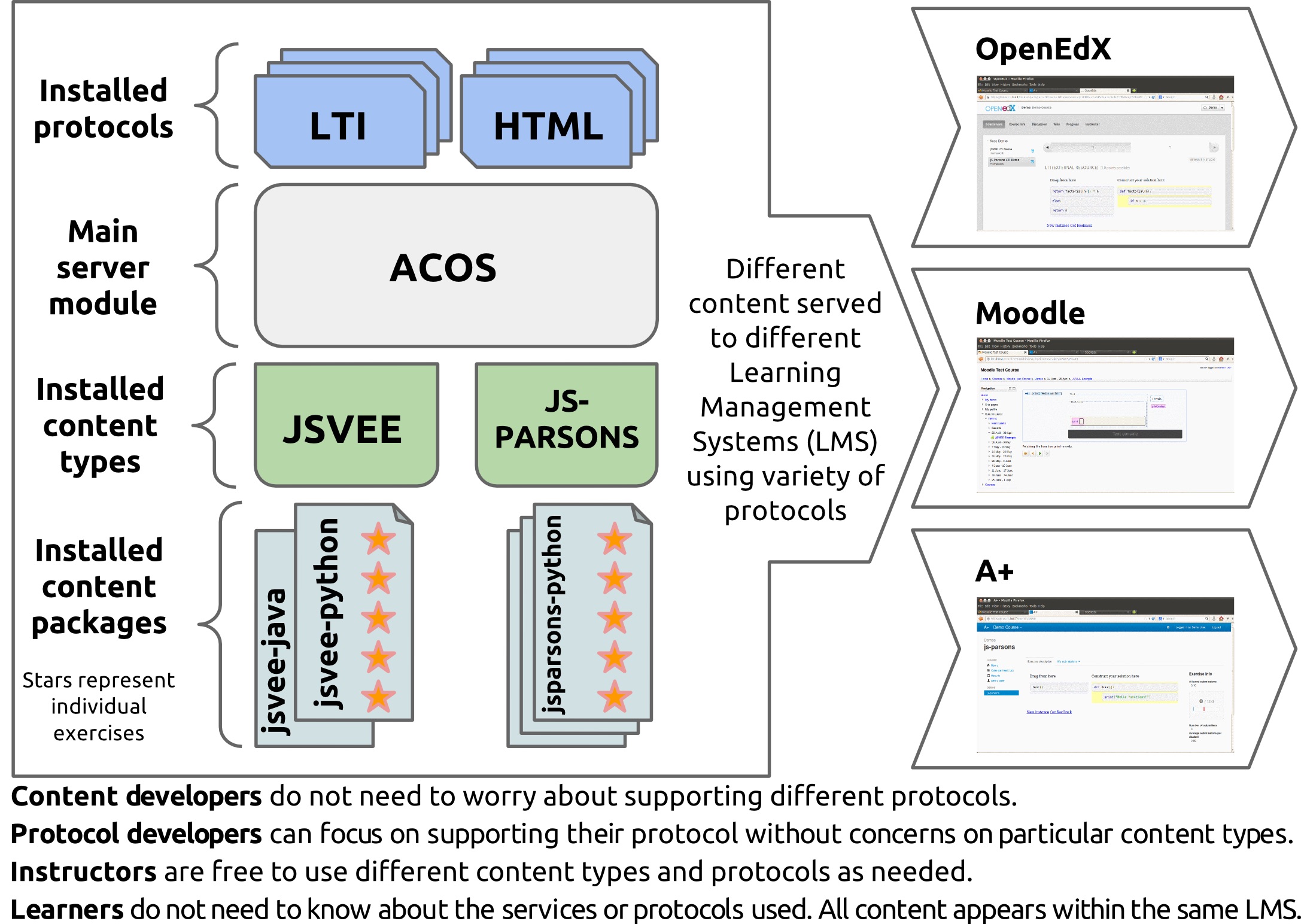Acos - Advanced Content Server
Acos server and related sub-projects are a method of distributing browser-based smart learning content in a reusable and interoperable way. The core idea is that different types of smart learning content can be hosted in Acos and offered to various Learning Management Systems (LMS) using different protocols.
This is a joint project with PAWS Lab at the University of Pittsburgh and Learning + Technology research group at Aalto University aiming at producing smart learning content on Python programming. The project Advanced Distributed Learning (ADL) Initiative.
The project is led by Professor Peter Brusilovsky. In Aalto University, the following persons are working with the project:
- Professor Lauri Malmi
- Lassi Haaranen
- Teemu Sirkiä
The Acos server is designed and implemented by Lassi Haaranen and Teemu Sirkiä.
Installation
To install Acos server, clone the repository and install necessary dependencies
by running npm install in the acos-server directory. Note that acos-server
expects npm version 3 in order to install
dependencies of content packages correctly.
For the time being, to install content types and packages use github notation with npm. E.g.:
# For JSVEE content type
npm install github:acos-server/acos-jsvee
# For JSVEE Python content
npm install github:acos-server/acos-jsvee-python
# When using npm3 you can also install the dependencies of a content package
# straightaway, e.g. this would also install acos-jsparsons correctly:
npm install acos-jsparsons-python
Running
To run the server use node bin/www.
Key Concepts

For content developers, Acos offers an easy way to add new content without the need to delve into details of various protocols used to transmit learning content.
For educators, Acos offers a repository of ready-made content that can easily be incorporated into an existing course. With certain content types, customization is also possible.
Content Type
Content type is an Acos package that defines a type of smart learning content. It does not contain any actual learning activities or exercises but rather the libraries and other code needed for those activities. Activities are defined in Content Packages.
Content Package
Content packages defined concrete learning activities of a particular content type. It always depends on the parent content type package to function. Different sets of activities of a particular type are packaged into content packages, e.g. packages for program visualizations (acos-jsvee-) exists for various programming languages.
Protocol
Different learning management systems use various protocols to transfer smart learning content and associated metadata such as points a learner has achieved. An example of such a protocol is Learning Tools Interoperability.
Content within Acos can be utilized by various supported protocols. These link external protocols, used with LMSs, to Acos content packages and types. Content types are implemented in a protocol-agnostic manner, so after a content type is implemented as an Acos-package it can be utilized by all supported protocols.
Tools
Acos also has the concept of a tool where various utility packages can be installed. As an example, Python code can be submitted to acos-python-parser in order to receive concepts used in the code which are parsed from AST.
Development
Please see doc/development.md.
Related Repositories
Acos Protocols:
- acos-aplus Support for A+ -protocol
- acos-html Displaying learning activities within an iframe without any communication with a LMS
- acos-lti Support for LTI-protocol
- acos-pitt Protocol to communicate with the University of Pittsburgh
Acos Content Types:
- acos-jsvee Content type for JSVEE program visualizations
- acos-annotated Content type for annotated code examples
- acos-jsparsons Content type for js-parsons code construction problems
Acos Content Packages:
- acos-jsvee-python Python code visualization content
- acos-jsvee-java Java code visualization content
- acos-jsparsons-python Python code construction content
- acos-jsparsons-python-custom Content package that enables creating js-parsons Python content that that is defined as an external JSON-file.
Acos Tool Packages
- acos-jsparsons-generator Tool to generate js-parsons exercises as JSON-file, used with acos-jsparsons-python-custom
- acos-python-parser Tool to parse Python code into a concept tree.
- acos-logging-keygenerator Tool to create keypairs for logging